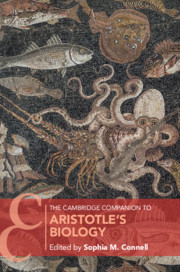Book contents
- The Cambridge Companion to Aristotle’s Biology
- OTHER VOLUMES IN THE SERIES OF CAMBRIDGE COMPANIONS
- The Cambridge Companion to Aristotle’s Biology
- Copyright page
- Contents
- Figures
- Contributors
- Abbreviations
- Introduction
- Chapter 1 Biology and Theology in Aristotle’s Theoretical and Practical Sciences
- Chapter 2 The Presocratics, Plato, and Aristotle’s Biology
- Chapter 3 Aristotle’s Biology and Early Medicine
- Chapter 4 Empiricism and Hearsay in Aristotle’s Zoological Collection of Facts
- Chapter 5 Parts of Animals Book 1 on Methods of Inquiry
- Chapter 6 Teleological Perspectives in Aristotle’s Biology
- Chapter 7 Aristotle’s Biological Metaphysics
- Chapter 8 Life-Cycles and the Actions of Nutritive Soul in Aristotle
- Chapter 9 Aristotle on Animal Generation and Hereditary Resemblance
- Chapter 10 The Science of Perception in Aristotle
- Chapter 11 Aristotle’s Theory of Animal Agency and the Problem of Self-Motion
- Chapter 12 Animal Cognition in Aristotle
- Chapter 13 Elements of Biology in Aristotle’s Political Science
- Chapter 14 The Early Reception of Aristotle’s Biology
- Chapter 15 The Reception of Aristotle’s Biology in Late Antiquity and Beyond
- Chapter 16 Aristotelian Teleology and Philosophy of Biology in the Darwinian Era
- Chapter 17 Aristotle and Contemporary Biology
- Afterword: Philosophical Issues in Aristotle’s Biology – Its Coming-to-Be and Its Being
- Bibliography
- General Index
- Index Locorum
- OTHER VOLUMES IN THE SERIES OF CAMBRIDGE COMPANIONS
- References
Chapter 9 - Aristotle on Animal Generation and Hereditary Resemblance
Published online by Cambridge University Press: 14 May 2021
- The Cambridge Companion to Aristotle’s Biology
- OTHER VOLUMES IN THE SERIES OF CAMBRIDGE COMPANIONS
- The Cambridge Companion to Aristotle’s Biology
- Copyright page
- Contents
- Figures
- Contributors
- Abbreviations
- Introduction
- Chapter 1 Biology and Theology in Aristotle’s Theoretical and Practical Sciences
- Chapter 2 The Presocratics, Plato, and Aristotle’s Biology
- Chapter 3 Aristotle’s Biology and Early Medicine
- Chapter 4 Empiricism and Hearsay in Aristotle’s Zoological Collection of Facts
- Chapter 5 Parts of Animals Book 1 on Methods of Inquiry
- Chapter 6 Teleological Perspectives in Aristotle’s Biology
- Chapter 7 Aristotle’s Biological Metaphysics
- Chapter 8 Life-Cycles and the Actions of Nutritive Soul in Aristotle
- Chapter 9 Aristotle on Animal Generation and Hereditary Resemblance
- Chapter 10 The Science of Perception in Aristotle
- Chapter 11 Aristotle’s Theory of Animal Agency and the Problem of Self-Motion
- Chapter 12 Animal Cognition in Aristotle
- Chapter 13 Elements of Biology in Aristotle’s Political Science
- Chapter 14 The Early Reception of Aristotle’s Biology
- Chapter 15 The Reception of Aristotle’s Biology in Late Antiquity and Beyond
- Chapter 16 Aristotelian Teleology and Philosophy of Biology in the Darwinian Era
- Chapter 17 Aristotle and Contemporary Biology
- Afterword: Philosophical Issues in Aristotle’s Biology – Its Coming-to-Be and Its Being
- Bibliography
- General Index
- Index Locorum
- OTHER VOLUMES IN THE SERIES OF CAMBRIDGE COMPANIONS
- References
Summary
This chapter provides an overview of the theories of generation and hereditary resemblance found in Aristotle’s work On the Generation of Animals. This treatise completes the project of explaining the development of the perfected living being, which the epigenetic process of embryological development aims for. Aristotle’s explanation of how a new animal comes into being fits to his four-causal scheme, by adding in the more specific principles, male and female. The opponent, thinks Aristotle, is wrong to think that the generative contributions of the parents (seed, sperma) derive from all parts of the body. Instead, what male and female contribute is the most refined nourishment that their bodies produce, which is ready to become all the parts of the body. Male and female roles are then differentiated: the female provides this blood-derived product to serve as that material body (material cause) while the male’s seed is further refined so as to initiate and direct that development as the efficient cause. Aristotle also explains how it is that particular animals end up as male or female and come to resemble their blood relatives. The chapter ends by reflecting on Aristotle’s sexism in his theory of generation.
- Type
- Chapter
- Information
- The Cambridge Companion to Aristotle's Biology , pp. 142 - 158Publisher: Cambridge University PressPrint publication year: 2021

